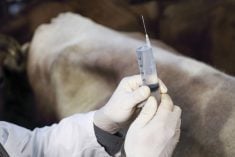Having a professional relationship with your veterinarian has never been more important.
New regulations passed by Health Canada that come into effect Dec. 1 will require that all medically important antimicrobials (MIA) — including those that are injected, dissolved in water, fed in feed, or administered as a bolus — will need a prescription.
Just dropping by the local feed store to pick up those ready-to-access pharma such as implants, all forms of penicillin, and tetracyclines will now require a full prescription. That means for every treatment you will need to have an existing veterinary-client-patient relationship.
Read Also

Canadian beekeepers call for regulatory accountability
Beekeepers say the Canadian Food Inspection Agency should restore U.S. packaged bee shipments, claiming the agency isn’t following evidence.
Before you panic on cost and drug access, this has been coming down the pipe from a global perspective for a long time. The World Health Organization issued warnings on antibiotic use a few years ago and Health Canada has responded. There are also active research trials going on to further investigate how to reduce the antibiotic and growth promotant load in food animal production.
It is not clear if the new regulation requires that each animal be physically seen and the prescription be for that specific treatment or if the whole bottle goes home. A good relationship where the veterinarian knows your herd or flock can help with preventive planning. It is common sense that the vet does not need to drive 200 kilometres to see an obvious foot rot that you have sent a photo of over your smartphone. But if there is a pen of sick calves, then it is a good idea to have your vet pop by to look and take some samples as there are a variety of viral or bacterial possibilities. Although with the technology today there are ways to view the problem to further address the concern, it does not however, negate the need to have a prescription.
- More with Brenda Schoepp: There’s a new kind of loneliness — but overcoming it isn’t easy
As all antibiotics do not act the same or cover the same issues, a blanket treatment such as feed additives and water-soluble medications will now require a prescription.
Take the time now to have a discussion with the veterinarians in your area if you do not have a veterinary-client-patient relationship, and open an account with the one of your choice. Invite the vet to do an initial visit to ensure he or she understands your operation and your standard operating procedures. This is important as the vet will have to set foot on your farm in order to write a script.
Some veterinary clinics are now offering this as a free one-time consult. Take advantage of this or ask that the initial visit be free. Talk about goals and expectations, and disclose if you are interested in strictly conventional or alternative animal care as several clinics are licensed for both. Ask about preventive programs and ensure that you follow through. For pet owners and small farm owners, ensure that your pets and small herd or flock are known to the clinic. This includes raising bees and fish (aquaculture).
The question of education has been brought to my attention and I know there is great value in education. But that does not make for a diagnosis nor will it reverse this legislation (which also applies to human medicine). Ask your veterinarian what you need to know, and also what he or she needs to know in the future to ensure early diagnosis and a quick response.
Will this hurt local businesses, such as small veterinary clinics?
On the contrary, the way that some established clinics are buying smaller ones indicates that they expect an increase in traffic. So don’t think that your local clinic will be closed. It likely will get busier, and even though you get the prescription from your vet who has a clinic 100 miles away, in Alberta, you can fill that prescription at the local clinic.
Do not, however, count on driving to the local farm supply store to buy food animal treatments any longer. These must be purchased at an establishment licensed to do so. Old standbys that are needed immediately, such as scour boluses, are included in the new regulation so advanced planning is really important. Again, early detection on your part, especially with a small flock or herd, will be critical so you have time for a consult and to fill a prescription if needed.
Think of it as having a relationship with your doctor. You have gone in and found out that treatment is necessary. The prescription he/she writes can be filled anywhere but you cannot go to the drugstore and pull it off the shelf.
It is the same now in veterinary medicine. You need a doctor, a prescription, a place to fill the prescription, and instructions on how to use the prescribed drug.
Veterinarians will now be required to submit an annual antimicrobial sales report and have been required by law to keep a record of the prescriptions on hand. The regulations are in play and are seen as the first step in antimicrobial stewardship.
Stay tuned for more information.
















